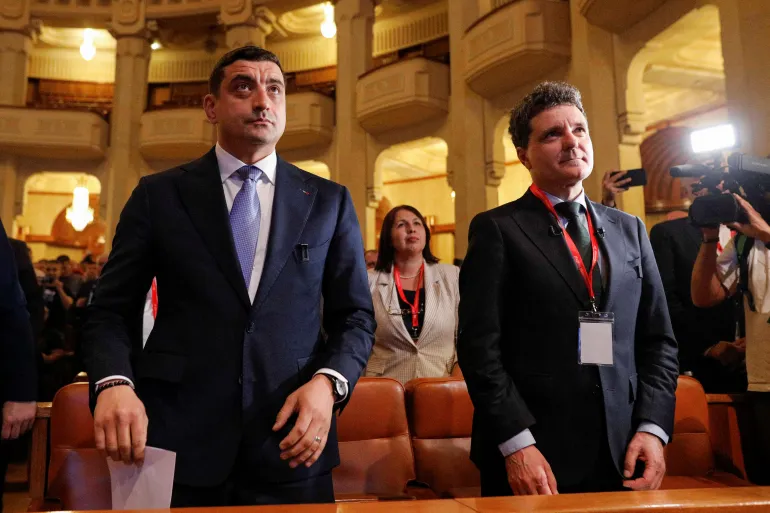Romania is heading into a high-stakes presidential runoff this Sunday, May 18, as the nation grapples with the fallout from a controversial annulment of the previous election and a growing ideological divide. The upcoming vote pits far-right nationalist George Simion against Bucharest’s centrist mayor Nicușor Dan, in what analysts describe as one of the most consequential elections in Romania’s post-communist history.
The election is being held after the annulment of the 2024 presidential race, which saw ultranationalist candidate Călin Georgescu advancing to the runoff before being disqualified due to alleged irregular financing and suspicions of foreign interference. The Constitutional Court ruled in early 2025 to invalidate the results, citing serious concerns about the integrity of the vote.
In the newly scheduled election, held in two rounds, George Simion emerged as the front-runner in the May 4 first round with about 41% of the vote. Nicușor Dan trailed significantly, earning around 21%, but managed to consolidate support from several pro-European parties that failed to make the runoff, setting the stage for a more competitive second round.
Simion, leader of the far-right Alliance for the Union of Romanians (AUR), has built his campaign around nationalist rhetoric, anti-globalist themes, and promises to “reclaim Romania’s sovereignty.” A vocal supporter of the disqualified Georgescu, Simion has promised to review the annulled 2024 results if elected and has even suggested appointing Georgescu as prime minister. His statements have sparked fears among moderates that democratic norms and Romania’s pro-European orientation may be at risk.
Critics accuse Simion of promoting a revisionist view of history and undermining Romania’s position within NATO and the European Union. His public appearances, often accompanied by nationalist demonstrations, have attracted both fervent support and widespread condemnation.
“I will fight to restore Romania’s historical identity and independence,” Simion said at a recent rally in Cluj. “We are not servants of Brussels or Washington. Romania will stand proud and alone, if it must.”
On the other side, Nicușor Dan has presented himself as a moderate, reform-minded alternative who can unify the country and defend democratic institutions. A trained mathematician and respected civic activist, Dan has pledged to strengthen transparency, combat corruption, and reinforce Romania’s strategic alliances with the West.
“This election is about values, about whether Romania continues as a democratic member of the European Union or slips into authoritarian nationalism,” Dan told supporters in Bucharest. “We need to rebuild trust in our institutions and bring stability back to our politics.”
The annulment of the previous election and the volatile political climate have further polarized an already divided electorate. Many Romanians remain disillusioned with the country’s political class, while a significant portion of younger voters have expressed concerns about the far-right’s growing influence.
The stakes extend beyond Romania’s borders. European officials are closely watching the outcome, wary that a Simion presidency could destabilize one of the EU’s eastern members and weaken the bloc’s unity amid ongoing tensions with Russia and the war in neighboring Ukraine.
While Simion has not explicitly called for withdrawing from NATO or the EU, his repeated criticism of Western influence and his advocacy for “sovereign governance” have led to speculation about possible shifts in foreign policy.
Meanwhile, Romania’s electoral commission has introduced new monitoring measures in response to the controversy surrounding the 2024 vote. International observers from the EU, OSCE, and other democratic institutions have been invited to ensure transparency in Sunday’s vote count.
As election day approaches, both campaigns have ramped up their efforts, with rallies, televised debates, and aggressive social media outreach. With the country on edge and both political camps warning of dire consequences if the other wins, Romania is bracing for a dramatic and potentially destabilizing conclusion to one of its most turbulent political chapters in recent memory.
Source; Al Jazeera



